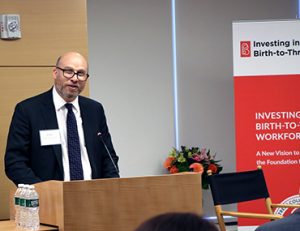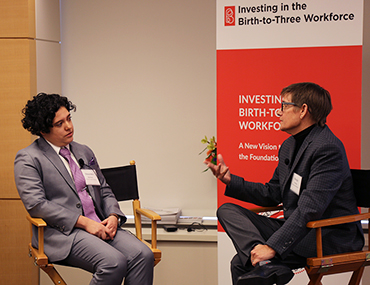Imagine what would happen if every child experienced consistent, high-quality, developmentally meaningful learning experiences from birth.
On January 27, the Bank Street Education Center released “Investing in the Birth-to-Three Workforce: A New Vision to Strengthen the Foundation for All Learning,” a new report providing policy recommendations to support birth-to-three educators and transform our nation’s early education system. The report asserts that all babies—regardless of race, income, or opportunity—should have access to high-quality learning experiences and provides a roadmap for policy reform at scale, including the development of residency programs and improved compensation for the infant/toddler workforce.
 “A child’s brain grows explosively during the first three years of life, with one million new neuro pathways forming per second. When we provide babies and toddlers with regular access to a sensitively attuned caregiver, we literally feed the growing brain, helping to build the brain architecture that supports everything in life that follows—our learning, our behavior, and even our health,” said Shael Polakow-Suransky, GSE ’00, President, Bank Street College. “If we care about equity, we have to build a system that nurtures healthy brain development starting at birth.”
“A child’s brain grows explosively during the first three years of life, with one million new neuro pathways forming per second. When we provide babies and toddlers with regular access to a sensitively attuned caregiver, we literally feed the growing brain, helping to build the brain architecture that supports everything in life that follows—our learning, our behavior, and even our health,” said Shael Polakow-Suransky, GSE ’00, President, Bank Street College. “If we care about equity, we have to build a system that nurtures healthy brain development starting at birth.”
The report launched at a convening at the Carnegie Corporation in New York City on January 27. Over 100 researchers, educators, practitioners, and policymakers met to celebrate the report’s launch, collaborate on a vision of change, and identify next steps for advancing reform.
“If we’re serious about building an excellent education system that sets every child up for success, we have to start with babies and toddlers, along with the educators who care for them. Investing in the early childhood workforce—including better compensation as well as meaningful professional learning opportunities—will ensure that our youngest children benefit from nurturing experiences that provide a foundation for lifelong learning,” said LaVerne Srinivasan, Vice President, National Program and Program Director, Education, Carnegie Corporation of New York.
A bold call for systems-level change, the report showcases models of high-quality educator preparation and includes examples of innovative financing structures for both compensation reform and the creation of residency programs to demonstrate how to fund, train, and retain highly effective infant/toddler practitioners. Vignettes from the viewpoint of child care providers, coaches, and Bank Street Graduate School of Education faculty provide a closer look at quality learning experiences, bringing to life concepts such as “reflective practice,” “applied knowledge,” and a “learner-centered approach” in real-life settings.
Grounded in the belief that infant/toddler educators must receive the same level of training and support as elementary school teachers, the report outlines comprehensive change in the field across several key areas: deepening expertise and professional learning, improving compensation, strengthening the systems that govern and support program quality, and generating public support.
“We’ve taken the lead by outlining how educators, researchers, and policy leaders can work together to transform the current system. We know zeroing in on the quality of preparation for infant/toddler educators will require support and resources akin to the kind of public and political will that made universal pre-K a reality in most states and large cities, and we are excited about the success of the convening and feedback from participants,” said Emily Sharrock, Associate Vice President of Strategy & New Program Design, Bank Street Education Center.
Speakers at the convening included Vartan Gregorian, President, Carnegie Corporation of New York, Polakow-Suransky, and Jacqueline Jones, President and CEO, Foundation for Child Development. Additional experts in the field engaged in a thought-provoking panel discussion titled “How Do We Build an Early Care and Education System in Which Quality Is Central?”
 Following the panel, attendees had the opportunity to explore these ideas through breakout sessions that centered on questions, such as “How Do You Build a System of Professional Learning That Achieves Instructional Quality Across Diverse Settings?” and “How Do You Build a Campaign to Generate the Momentum Required to Get This Work Done?” After the event, guests enjoyed dinner and additional opportunities for networking and informal discussions.
Following the panel, attendees had the opportunity to explore these ideas through breakout sessions that centered on questions, such as “How Do You Build a System of Professional Learning That Achieves Instructional Quality Across Diverse Settings?” and “How Do You Build a Campaign to Generate the Momentum Required to Get This Work Done?” After the event, guests enjoyed dinner and additional opportunities for networking and informal discussions.
“We’re at a critical moment in this country where the question is not ‘why invest in early childhood?’ It’s ‘how do we invest in early childhood,’” said Sarah Rittling, Executive Director, First Five Years Fund, and leader of one of the afternoon’s breakout sessions.
The report was researched and written by Sharrock and Courtney Parkerson, consultant, and was funded by the Carnegie Corporation of New York.
A working group of more than 20 leaders in the field and a set of special advisors from ZERO TO THREE and the Center for the Study of Child Care Employment at the University of California, Berkeley as well as Harriet Dichter, Consulting Director, IICF Early Education Services; Joan Lombardi, Director, Early Opportunities; and Margie Brickley, Program Director, Infant & Family Development and Coordinator, Infancy Institute, Bank Street Graduate School of Education helped to inform and guide the report. In addition, Virginia Casper, Bank Street Graduate School Faculty Emerita, authored educator vignettes and offered advice on concepts of quality care and adherence to Bank Street’s core approach to educator preparation. A complete list of more than 100 stakeholders who contributed to the project is listed in the report’s appendix.
To read the full report, visit bankstreet.edu/birth-to-three or join the discussion by following the hashtag #LearningStartsAtBirth.